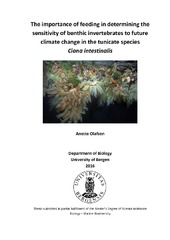| dc.description.abstract | Anthropogenically induced global climate change is one of the worlds biggest threats today, with marine ecosystems particularly vulnerable. In the future, the ocean temperature is expected to rise with 2 °C followed by a reduction in pH by 0.3-0.4 units. The future function, survival and distribution of marine species are dependent on their physiological response to these future changes. This study aims therefore to investigate the importance of feeding in determining the sensitivity of the tunicate, Ciona intestinalis, to future climate change. This was done by looking into how ocean warming (OW) and ocean acidification (OA) would affect eco-physiological behaviour and the scope for growth in C. intestinalis. Our study was carried out by feeding the animals ad libitum using the natural system of surface water, with adequate content of seston, and deep water, with limited content of seston. The study comprised two experiments, where Exp. 1 kept the animals in four temperature treatments (7, 12, 15 and 17 °C) and Exp. 2 kept the animals in a combination of four temperature and pH treatments (12 °C with pH 8, 12 °C with pH 7.7, 15 °C with pH 8, and 15 °C with pH 7.7). Our results suggests that the combination of multiple stressors like OA and OW will impose a bigger threat when occurring together. C. intestinalis had a lower toleration level to the combined effects of OW and OA. Interestingly, the food limited animals scope for growth implied that they should be showing a positive growth response. However they were actually shrinking in size. When being subjected to stress from OW and OA the maintenance of homeostasis become more energetically expensive. C. intestinalis seemed to compensate for this energy demand by increasing their feeding and re-allocating energy away from processes like growth and respiration in order to survive. It seems evident that the availability of food is a considerable stressor affecting C. intestinalis, which can have various effects when occurring in combination with other stressors. | en_US |
